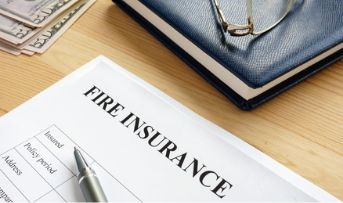General Insurance Blogs, Articles & Updates by - Magma HDI
Have us call you
- RENEW YOUR POLICY
- BUY NEW POLICY

Let's understand the advantages of fire insurance for businesses
Running a business involves many uncertainties and risks, making it a venture challenging for every business person. While it provides multifold rewards for the resources invested into it, it also requires a lot of effort and time to scale your business. Until then, you must consider multiple factors at all times whose fluctuations may adversely impact the business operations.
The risk of mishaps outside the control of the management is a constant source of worry since the loss caused by such incidents is enormous. A business's most common threats are natural disasters, fires, and explosions, especially in manufacturing entities. While there is no way to eliminate such threats directly, a comprehensive and adequate policy purchased from a fire insurance company goes a long way in insuring your business premises and assets from the damage caused by such events.
Here is a detailed understanding of why you should purchase a fire insurance policy for your business and the advantages it provides.
What is covered under a fire insurance policy?
A fire insurance cover protects your insurable assets against more than just fires. It covers damages due to fires, natural calamities, lightning, fire explosions, aircraft damages, landslides, and bushfires. A closer inspection of your insurance will provide greater insight into the events from which your business is secured.
While the cover has several inclusions, it also has notable exclusions that you must know. Some excluded events are wilful fires, electricity leaks, fires caused by short-circuiting, war, etc. It is essential to check the fine print of your contract before signing it.
Who can purchase a fire insurance policy?
A fire insurance company offers insurance covers against fire to businesses of any size and scale, asset holders like buildings or furniture, holders of inventory stock like retailers, godown owners, manufacturing entities, hotels and lodgings, and any other service-providing institutions. This is an inclusive list covering any person, company, or business holding assets that require protection against fires.
Advantages of fire insurance.
Now that we know who can purchase fire insurance coverage and which assets it can protect, here are the advantages it offers business owners.
1. Loss against damage:
The effect of a fire is unimaginable. While it is a contingent misfortune, it is best to be secured against such an event, as the loss is far too significant for a business to bear. A fire policy covers the loss caused by fire to any movable or immovable property of the business, reducing the financial loss incurred by the enterprise.
2. Wide range of inclusions & add-ons:
Besides fires, most fire insurances cover other events to make it a comprehensive policy. They provide options to include add-ons to increase the coverage at an added cost.
The list of additional events as add-ons comprises earthquakes, forest fires, consequential loss of profits, rent, etc. At the payment of a nominal price, you can ensure that your business is completely secured against any event related to fires.
3. Ease of restarting business:
In the event of a fire, it is challenging for a business to cover the losses and continue its operations at its original scale. With adequate fire insurance, it is easier to cope with the aftereffects as the business only has to focus on its operations instead of worrying about replacing the losses.
Therefore, it is fair to conclude that purchasing insurance coverage from a fire insurance company protects a business in the event of a contingent fire, as the advantages outweigh its cost. You must also ensure that you install and regularly keep the fire safety equipment up-to-date at your workplace.
Click HERE to buy insurance from the best fire insurance company.
Disclaimer: The information provided above is for illustrative purposes only. To get more details, please refer to policy wordings and prospectus before purchasing a policy.

Here are some common yoga injuries and the ways to fix them
Yoga is considered one of the oldest forms of physical exercise in the history of the world. While its origins seem Indian, yoga is practiced globally by people of different ethnicities and cultures. It helps you keep your body flexible, develop a more robust immune system, and bring a certain sense of discipline to your life. The various asanas and forms in yoga ensure that your body and mind work synchronously. It also regulates low-stress levels, induces better sleep quality, decreases blood pressure, heals current ailments, and benefits mental health issues like anxiety, depression, and much more.
There are many advantages of inculcating the habit of practicing yoga daily in your lifestyle. But everything comes with its risks. You must strictly adhere to the methodologies and procedures while performing various asanas to avoid unwanted accidents. Lack of proper understanding and implementation of the instructions can cause more harm to your body than expected.
Here are some common yoga injuries and the ways to fix them.
1. Be careful about your shoulders and knees:
Some of the most frequent yoga injuries include repetitive stress in the shoulders resulting in strain, chronic pain, or dislocation (ball and socket joint issues). Although the latter happens in extreme cases, strain and chronic pain can cause massive discomfort in your day-to-day activities. The muscle injuries in the shoulder area can be caused by overstretching too.
2. Neck pain can be frustrating:
Yoga postures like headstands and shoulder stands can cause severe neck injuries if not performed carefully or under supervision. Such poses can even put your vertebrae under extreme pressure, eventually leading to excruciating pain, compression, and flexibility issues. You might also face joint issues and muscle spasms, which can cause soreness and problems with your neck movement.
3. Save yourself from back problems:
When done incorrectly, yoga can cause discomfort in your lower back. You might stress your back even more while performing your daily chores. This might substantially elevate your back issues, leading to pain, spinal cord problems, movement restrictions, hip issues, disc problems in worse situations, etc.
Since your lower back is connected to significant movements in your upper or lower body, even the slightest task, such as stretching, can become a huge pain point in case of lower back troubles due to yoga injuries.
Now that we have discussed some common injuries, let’s discuss how we can fix them. Avoid putting excessive pressure on your body to perform a particular yoga posture. While it is essential to push your body to its limits, you need to draw a line and understand when it’s time to pull back. Use blankets or a yoga mat to significantly reduce the pressure from your lower back during seated yoga positions.
Perform the yoga postures in stages, so you don’t end up overstretching your shoulders. Avoid pulling too hard and take a breather whenever required. You can wear kneecaps to support your knees while performing the asanas. Again, perform such postures in stages. Make your body familiar with the pressure you might experience. Always ensure to let your body a little loose once you are done with your yoga session. You should include warm-down exercises to relax your body after heavy yoga/workout.
We all understand the importance of yoga and how it helps us stay fit and healthy, thus paving the path for a smoother life. But certain situations are out of your control and can endanger your or your loved ones’ health. Purchasing health insurance is crucial to safeguard yourself against such circumstances and face the problem instead of worrying about financial distress. You can explore all your options available in the market from the comfort of your home with an array of digital options. You can buy health insurance online India to cater to your needs in the best way possible.
Click HERE to know more about how you can buy health insurance online India.
Disclaimer: The information provided above is for illustrative purposes only. To get more details, please refer to policy wordings and prospectus before purchasing a policy.

More information on health insurance terms while planning an organ transplant
Organ transplant is a process where we replace a malfunctioning organ with a healthy one from a fit donor. With the advancement of medical science and the introduction of state-of-art technologies, we can go for transplants of vital organs such as the liver, kidney, heart, etc. But these life-saving transplants come with heavy costs ranging between 1-2 lakhs to 30-35 lakhs of rupees!
Health insurance providers have started offering policies covering organ transplants to meet such heavy expenditures. You read it right! Let us look into such policies in detail.
1. Coverage:
Two parties are involved in organ transplants: the organ receiver and its donor. Health insurance companies will cover the cost of various tests, hospitalisation expenditure, cost of surgery, and other related procedures vital for an organ transplant of the receiver. However, there are restrictions on coverage with regard to donor expenses.
The insurance policy will cover the in-patient hospitalisation charges of the donor. But it does not cover expenses regarding medical screening, storage or transportation of the organ, and pre and post-hospitalisation charges that the donor may incur in the process. Coverage for the above costs is subject to the sum insured and cannot exceed that.
2. Types of costs:
You should be aware of the types of costs that you will incur during an organ transplant. The first cost to bear is organ screening. The hospital will check the condition of the donor's organ.
The donor will incur pre-hospitalisation costs for medicines and different tests. Then hospitalisation expenses, including room charges, doctor fees, nursing expenditures, etc., will be considered. Post all these initial formalities and screenings; the actual surgery can be performed.
Post-surgery complications often arise, and there might be a need to bear additional hospital and doctor fees, medical expenditures, etc. The donor's post-surgery expenses, such as doctor follow-up, medication, etc., are also to be considered.
3. Waiting and survival period:
A health insurance policyholder with organ transplant coverage cannot raise a claim for the initial few days after buying the policy. Such policies usually come with a waiting period of 90 days to even 2-3 years from the policy's inception, after which a claim for an organ transplant can be raised. This waiting time may vary from one policy to another as per their respective terms and conditions.
4. Guiding Act:
The "Transplantation of Human Organs Act (THOA) 1994" is the guiding act for all organ transplants in India. It guides the removal, storage, and transplantation process of human organs. Any health insurance service provider will not cover your organ transplant claim if it violates any of the provisions of this law. Also, your claim will be rejected if the organ transplant is done for commercial dealings or smuggling activities of human organs.
Saving a life by donating or receiving an organ is a fortunate incident, and having the right insurance plan can make the experience less daunting. We recommend that online health insurance is the best way to invest in organ transplantation coverage. Buying the policy online will allow you to study and compare various policies that provide such coverage per our convenience and requirements.
Organ transplantation is an expensive process, and making haste decisions can land you in unwanted trouble. Go through each policy's terms and conditions in detail before making your final decision.
You should also ask for a detailed break-up of the recipient and donor expenses from the hospital before going for an organ transplant. This will give you a fair idea of what expenditure will be excluded from your insurance policy coverage and what will be its financial implication.
Click HERE to buy an online health insurance policy.
Disclaimer: The information provided above is for illustrative purposes only. To get more details, please refer to policy wordings and prospectus before purchasing a policy.

How is AI set to revolutionise the car insurance sector
AI has evolved tremendously over recent years, and its impact can be seen in every sector of the economy. The car insurance sector is also touched by AI and is all set to revolutionise it. Data modelling and machine learning applications are changing the insurance process and customer experience. Its role is increasing in car inspection, claim processing, and car insurance renewal.
Let us see how AI is set to revolutionise the car insurance sector in detail.
1. Car Insurance renewal:
Policyholders must upload photos and videos of their cars from all angles on a cloud-based app. No human assistance is required in this process on the insurance company's end because of AI. Computers evaluate the condition of the car, quote the premium amount accordingly and process the renewal.
AI is helping companies to save millions of rupees as their manpower requirement for the insurance renewal process has gone down drastically. Also, it is helping to save a lot of valuable time for companies and customers by making the renewal process swift and streamlined.
2. Claim processing:
AI is also set to revolutionise the processing of claims in the car insurance sector. Currently, claim management and processing are primarily manual. It takes a lot of time and is prone to errors and inefficiencies. This process is known to eat up around 50%-80% of the revenues generated by premiums.
Machines and computers need sufficient learning data and algorithms to master claims processing. AI can be used for initial claims routing, thorough inspection, and assessing the nature of damage and time for repairs. It can save several hours in processing every individual claim.
More importantly, AI can detect fraudulent claims, a major revenue drainer for every insurance company. AI can help to detect out-of-the-ordinary behaviour and claims coming for processing, which sometimes normal eyes can fail to detect. Some AI-based applications are capable of running background checks on customers coming for insurance claims. The insurance company can assess the risks associated with a respective customer or business.
3. Telematics-based insurance plans:
AI has enabled car insurance companies to offer telematics-based insurance plans to their customers. A "Pay-as-you-drive" plan can be used to charge premiums for insurance plans according to the number of kilometres a customer drives over time. AI can also assess driving style and behaviour of the drivers and charge premiums accordingly.
Thus, AI can be a revolutionising tool for "Pay-how-you-drive" plans and help companies to offer sophisticated and need-based plans to their customers. Such plans can help an insurance company to increase its clientele and profitability.
4. Competitive premiums:
AI can be very helpful in tracking the premiums charged by competitors for their car insurance plans in real time. A car insurance provider can accordingly charge a lower premium or offer a better car insurance price in India to the customers and ensure that the do not go away to the competitors.
The adoption of AI by insurers will be an essential criterion for companies to bring down their car insurance price in India. The insurance companies will pass on the savings due to AI to their customers, who will eventually benefit. Companies that do not adopt AI in the near future will be laggards, and competition will take over them.
Click HERE to get the best car insurance price in India for all your needs.
Disclaimer: The information provided above is for illustrative purposes only. To get more details, please refer to policy wordings and prospectus before purchasing a policy.

Immediate steps you must take in case of identity theft
Personal information is an asset that one must safeguard at all costs. In the olden days, identity theft was limited to misrepresentation by misuse of a person's name and identity, but in the modern world, its implications are far more severe.
In the era of digitalisation, where a person's identity proofs are linked to their bank accounts and other financial databases, it is easy for a criminal to wreak havoc with a stolen identity. The most vulnerable personal identities generally stolen include social media accounts, PAN, Aadhar, email, and bank details.
While different kinds of thefts and infringements are often discussed, identity theft insurance in India is an under-discussed topic that few are aware of. It is essential to protect oneself from such contingent threats using adequate insurance. In the backdrop of a crisis, they play a vital role in recouping losses.
If you suspect that your identity has been impersonated, here are the steps you must take immediately.
1. Identify the violation:
The first step after discovering that there seems to be some misuse of your information is to determine the extent of unauthorised action. Once you have identified the broad area, which may be one of the following- credit, taxes, or government benefits fraud, amongst others, try to identify the source of misuse of information.
2. Notify appropriate authorities:
While you can trace the source of misuse by jogging your memory, it is often infeasible. Even if you can trace the origin, your immediate action should be to notify the concerned authorities of the fraud details. This means that there will be a different concerned authority to approach each type of identity misuse.
For example, you should notify the Department of Telecommunications if your documents have been used to register for a SIM card. For cybercrimes or online fraud, you should approach the cybercrime police department. Similarly, you should immediately notify your bank to stop the payments in case you witness any unauthorised bank transactions.
3. Identify the extent of the damage:
Once you have identified and reported the problem, it is time to find the damage incurred. You may simplify this by checking your bank statements and any financial databases by scrutinising any recent transactions that appear to be unordinary and unauthorised by you.
4. File for damages:
Once you have a general estimate of the amount of loss incurred, you can file a lawsuit under the existing laws in India that provide relief against such fraud after fulfilling the conditions. A lawyer's aid can help handle the case legally.
While these are the steps you can take after realising the theft of your identity, here are some precautionary measures to ensure that your confidential data is not breached.
● Never save passwords:
While saving passwords to your accounts provides convenience during login, it also increases your susceptibility to fraudsters looking for opportunities to steal your information.
● Do not use unreliable sites:
One must always be careful when sharing basic details or banking information on any site, especially for new or unrecognisable sites. Do your due diligence before taking on such risks to ascertain its authenticity.
● Utilise multiple authentications:
Most sites now offer 2-factor and 3-factor authentication to secure your account. Ensure that you optimise such facilities to keep your accounts and data safe.
● Dispose of physical copies of identification:
It is common for most official processes to require the submission of physical copies of original identification records. Ensure that the printer and receiver get rid of the documents immediately after the official use if fulfilled.
● Purchase identity theft insurance:
While it is not so common, it is ideal to purchase theft insurance in India to protect yourself from identity theft in case the need arises.
The constant development of technology brings convenience to our lives while opening new windows for mischievous minds to scam people and make profits. Always have the mindset to follow the above preventive measures to minimise or eliminate identity theft threats. And don't forget to have the best theft insurance in India for your rescue if you find yourself trapped in a fraud or compromised identity.
Click HERE to buy the best theft insurance in India.
Disclaimer: The information provided above is for illustrative purposes only. To get more details, please refer to policy wordings and prospectus before purchasing a policy.

Post-marriage amendments to be made in your health insurance policy
Marriage is a monumental step in anyone's life. And if you have made this important decision and are going to or have recently got married, one of the essential things to consider is your and your spouse's financial security!
Since you intend to spend your entire life together, you must have adequate health insurance coverage. Consequently, reviewing and updating your health insurance plan after marriage is essential to ensure the best coverage for you and your new family.
1. Understand your new healthcare needs:
While your health insurance needs may change, it is best to have in-depth healthcare knowledge on what type of coverage would best suit you and your family. Nowadays, most plans include outpatient care, prescription drugs, and hospital or facility stays for a fixed premium. Sometimes, your coverage may include vision, dental needs, and even mental healthcare.
Suppose you have a specific need for any coverage or want to consult about the best options for your family. In that case, we suggest you seek help from your medical insurance provider and financial adviser. You can also surf the internet to gain a comprehensive understanding of all online health insurance policies.
2. Add your spouse to an existing plan:
If you are satisfied with your current health insurance plan coverage, you can add your spouse to your existing policy.
Whoever owns the policy can initiate this process by submitting the necessary documents (such as the marriage certificates and KYC documents for the new member, comprising evidence of identification, proof of age, and pictures) and completing the necessary form. The adjustment will also require changes in the policy premium for the newly added member.
3. Include maternity benefits under your policy:
Most health insurance policies have a maternity waiting period of two to four years. You can only consider obtaining the wife's maternity benefits once the waiting time is over. Therefore, if you don't include maternity benefits in your plan now, you will be unable to utilise them when planning a family.
4. More add-on covers:
As a result of the many changes that marriage entails, you and your spouse may want additional protection for your family. Now is the time to look into online health insurance add-ons that you can include in your coverage to make it more tailored to your specific requirements.
In addition to maternity insurance, you should think about purchasing a critical illness cover, personal accident protection, or a top-up cover. These are all powerful add-ons to consider. As some of these coverages may come with waiting periods, making the decision as soon as possible is crucial.
5. Choose the right insurer:
When you update your health plan or acquire a new one to meet your post-marriage requirements, it is recommended that you switch to an insurer that provides superior facilities and services to get the most out of your new plan.
Therefore, if unsatisfied with your current insurance provider, you may easily switch to a new and potentially superior insurance company. Look for an insurer that provides you with various rider coverages and benefits.
Marriage is one of the most critical decisions in your life, and you must handle it responsibly. You must have not only the coverage you need but also the coverage that is best for your family. By doing your homework and researching the best online health insurance options available, you can ensure that you will protect your family's health for years to come.
Click HERE to buy the best online health insurance policy.
Disclaimer: The information provided above is for illustrative purposes only. To get more details, please refer to policy wordings and prospectus before purchasing a policy.

How to take care of yourself amid changing seasons
Every season has its own character and is anticipated to practically play a hot-and-cold game with us. The seasonal changes sometimes make us feel a little under the weather. More illnesses, particularly colds, are frequently associated with this unpredictability of the temperature and weather. The main reason is that individuals often make the rookie error of becoming overly impatient and slipping into summer mode too quickly!
While there is no way to prevent falling sick during seasonal transitions, opting to buy health insurance online India and taking a few precautions can help you minimise the chance of developing common illnesses.
Five considerations as the weather begins to change are listed below.
1. Drink enough water:
Commonly prescribed for most health issues, drinking adequate water is essential, especially for staying healthy during the changing seasons. If you consume enough water, you can remove all the toxins from your body. It keeps your throat and nasal passages wet, preventing bacteria from having a chance to survive. To clear mucus from your body, you must also maintain a very high level of hydration. Therefore, consume at least eight glasses of water daily to maintain good health.
2. Avoid immediate cooling or air-conditioning:
Want to do it? It could feel warm sometimes in the middle of the season, and you might want to turn on the fan or use A/C. Subjecting your body to such abrupt temperature shifts can make you ill. A simple flick of the switch might result in several issues, ranging from a headache to a dry and scratchy throat.
3. Keep clad in cosy attire:
Giving up your cardigans and sweatshirts just yet isn't the best option, but losing a few layers is perfectly acceptable. Dressing in woollen clothes provides warmth and protection throughout the winter. Exposure and diseases like the flu might result from not wearing warm clothing. Even though the weather may be warm during the change of seasons, you need to keep yourself warm. It could make you sick to switch to summer attire so quickly.
4. Continue your exercise regimen:
Regarding exercise sessions, there are no excuses at all. You may have been sluggish throughout the winter, but you must start working out again, especially when the seasons change. Exercise enhances the immune system and promotes blood circulation, which can help you avoid illnesses. Physical activity can shorten the duration of the common cold, one of the diseases most closely related to the change in seasons. Consequently, put on your athletic shoes and get moving!
5. Keep harmful substances at a distance:
To deal with your flue like feelings, refrain from using harmful substances like alcohol, drugs, or tobacco. Although these could appear to make you feel better in the short term, they can make you feel worse over time. These substances increase your risk of getting sick.
Medical crises can happen at any time. You should immediately seek medical attention if you or any family member exhibit any sickness symptoms. Many symptoms, especially in youngsters and the elderly, are frequently dismissed as minor. This often leads to a minor issue snowballing into a significant illness that could have been prevented with immediate medical intervention. Instead of shying away from medical facilities due to the high healthcare costs, buy health insurance online India for yourself and your family to cover medical expenses.
Click HERE to buy health insurance online India.
Disclaimer: The information provided above is for illustrative purposes only. To get more details, please refer to policy wordings and prospectus before purchasing a policy.

Here is why too much sitting can be dangerous for your body
Regular office work requires prolonged periods of desk sitting. Because of this excessive sitting, people tend to get various health issues like obesity, diabetes and risk of some chronic diseases. This post will discuss how sitting all day at your desk can harm your health.
1. Sedentary lifestyles have become increasingly common:
People spend a lot of time sitting down, whether working, socialising, studying, or travelling. Whether behind the wheel, at a desk, or in front of the TV, most people spend over half of their day's hours seated. An office worker may sit for as much as 15 hours a day. However, the average agricultural worker spends less than three hours a day seated.
2. Calorie expenditure is reduced:
Calories are burned even while you're not exercising, just by standing, strolling, and fidgeting. This type of energy use is called non-exercise activity thermogenesis (NEAT), and not getting enough of it is a big reason people gain weight.
No significant energy is used up by sitting or lounging around all day. It has a significant impact on your ability to burn calories through NEAT. Research shows that those who work in agriculture can burn up to 1,000 more calories per day than those who sit at a desk.
3. The risk of gaining weight while sitting is higher than when standing:
On average, obese people sit for an extra two hours a day compared to their normal-weight counterparts. It has been shown that prolonged sitting throughout the day can cause weight gain and a number of other health concerns.
Obesity or fat accumulation can lead to increased risks of heart disease and also put pressure on other vital organs like the liver, kidney, etc. You may also experience early joint pain, stiffness of body parts, backaches, and reduced stamina and endurance due to inactivity.
4. Sickness is associated with inactivity:
According to an analysis of data on more than a million people, sedentary lifestyles are associated with an increased risk of severe health conditions, early signs of ailments like hypertension and diabetes in younger people, and even cause premature death.
An increased risk of type 2 diabetes by 110% and heart disease by 140% have been linked to a lack of physical activity over the long term. Research has shown that sitting for long periods or walking less than 1,500 steps per day can significantly increase insulin resistance, a significant risk factor for type 2 diabetes.
5. Even if you work out regularly, you still are at risk:
Even if you work out hard for an hour, sitting for the rest of the day is still bad for your health. It is important to take short breaks and keep the constant movement of your body throughout the day to avoid getting at risk of health issues due to lack of motion. Regular walking and exercises are necessary to keep your body in its best shape.
While taking breaks is crucial, indulging in physical activities at regular intervals of the day is equally important. Those who spend their days sitting at a desk can benefit from investing in a standing desk or taking frequent breaks to walk around the office. Cutting down on how much time you spend sitting is just as crucial for your health as what you eat and how often you work out.
It would help if you also buy health insurance to ensure you get the best care possible without putting a strain on your finances during the time of need. Rising medical costs force many to make compromise with the situation. You can purchase insurance from the best health insurance company in India, which will keep you secure in such cases.
Click HERE to get insurance benefits from the best health insurance company in India.
Disclaimer: The information provided above is for illustrative purposes only. To get more details, please refer to policy wordings and prospectus before purchasing a policy.

Tips for the best winter joint protection for the elders
The winter season is the perfect escape from the hot and humid climate. But what appears soothing to the youth can be troublesome for elders. Winter is a difficult season to withstand and maintain good health, especially for elders suffering from joint pain. This season comes with cold conditions, low atmospheric pressure, and dry air, making the muscles tight and rigid, which results in joint pain.
If you have elders at home and you're wondering how to make the winter season more enjoyable for them, here are a few tips for the best joint protection.
1. Move frequently:
The winter season makes elders lazy and feels less energetic. They avoid going out and prefer staying indoors, often sitting or lying on the bed to stay warm and cosy. However, they should avoid doing this as their body will become more rigid and joints achy.
Elders need to be active during the winter months. They may take up small household chores to keep their mind and body active. Even a brisk walk now and then inside the house will help. Frequent movement of the joints will ensure they are not jammed and do not ache much.
2. Regular exercise:
Elders should exercise regularly during winter to keep their bodies in shape and their joints in rhythm. However, they should take proper care while exercising and not overdo it as it can cause more harm than benefit. Light cardio exercises, yoga, and stretching can be helpful to keep the elders free from joint pain. Exercise can also help to cure existing joint pain, if any.
3. A restricted and healthy diet:
Winters are a great time for food lovers and munchers to grab quick bites while watching their favourite TV shows or movies. We tend to eat more which increases the sugar intake. This can negatively impact the body weight and invite unwanted health problems.
Elders need to restrict their diet and avoid overeating. More weight means more pressure on the joints, resulting in pain. Weight control will help them to keep their joint pain in control and keep other critical illnesses like heart issues, hypertension, diabetes, etc., at bay.
Moreover, they need to maintain a healthy diet. Food with anti-inflammatory properties helps to relieve joint pain. Such food includes nuts, seeds, fish, turmeric, garlic, onion, and dark green leafy vegetables.
4. Supplements:
Many supplements available in the market help reduce joint pain and stiffness. Elders may also opt for calcium supplements to make their bones stronger and healthier.
5. Dress-up adequately:
Elders should take adequate care while dressing up in winter. They should choose attire that will keep them warm at home or if they plan to go out. Good quality jackets and coats are a must while going out. Also, they should stock up on woollen gloves and socks to keep themselves warm. Adequate clothing will ensure they do not suffer joint pain even in the harshest weather.
6. Stay well hydrated:
We tend to drink less water and fluids in the winter than in the summer. Staying hydrated is very important for elders during winter. They should frequently drink water and even warm liquids such as soup and tea to feel energetic and fresh throughout the day. Proper hydration will help the body to maintain its temperature. Muscles will be more flexible, helping them to keep the joint pain in control.
Now we know how winter can directly result in joint pain, especially in the elderly. Following the above tips judiciously can help them to curtail or minimise it in the tough cold weather and create a comfort zone for themselves.
Similarly, you should consider the best health insurance in India for parents and elders at home. These plans are specially curated to minimise your worries about their health and medical expenses. Under all severe circumstances, a comprehensive health insurance policy will ensure the elders' well-being.
Click HERE to buy the best health insurance in India for parents.
Disclaimer: The information provided above is for illustrative purposes only. To get more details, please refer to policy wordings and prospectus before purchasing a policy.

How can general insurance be a crucial step to women's independence and financial freedom
Recent years have seen a rising number of women actively contributing in every sector. Whether police services, office-goers, or cab drivers, women are stepping out of their homes to build a future for themselves. Even with the ever-growing numbers of women workers, only fifty percent of women invest in general insurance as opposed to seventy-two percent of their male counterparts.
Why are the numbers so different? Although there has been a progressive shift in women's lives, general insurance was conventionally associated with the household males. During the earlier days, men were the sole breadwinners of the household and handled all monetary transactions. So, it was usually considered the males' responsibility to ensure that the family remained financially covered. This lifestyle trend has not been seen as evident as the societal change that women have faced.
This article will examine why general insurance is essential for women and how it paves a path to financial freedom.
1. Financial security:
It is important to remember that general insurance is an essential resource for the family. With more women actively contributing financially to their respective households, general insurance becomes an irreplaceable asset. It not only acts as a backbone to the family's financial stability but also provides tax benefits, adding more value.
In addition, general insurance covers many things, including travel, medical, artificial disasters, theft, etc. Therefore, general insurance is necessary for women to ensure their families' financial security if they become the household's sole breadwinner.
2. Financial independence:
Statistics show that most women, even when earning, depend on their spouses or family for financial knowledge. This is surprising in consideration of the rapid growth of women in all sectors of life. To combat this dependency and to be able to handle their own money, investing in general insurance is the first step. Taking care of your finances makes you confident and in charge of your own money without having to depend on anyone.
Having your finances sorted at every step will ensure that your children, parents, or spouse can have a comfortable lifestyle, safe and enjoyable vacations with no worries about lost luggage or cancelled flights, or you can visit the best hospitals without worrying about the bills going through the roof. There are so many advantages and benefits to favouring you.
3. Loans and debts:
Most households must rely on loans to pay for their houses, vehicles, and other significant expenses. In case of a mishap, general insurance will be able to help you cover the loss and ensure that you won't fall behind on your loan payments due to the distress of any emergencies.
4. Critical illness benefits:
Certain health conditions are specific to women, such as breast cancer, cervical cancer, etc. With an unhealthy lifestyle and heavy amounts of impurity in the food and drinks one consumes, these diseases have become a part of one in eight urban women populations. Comprehensive health insurance and critical illness protection can help you rest assured in case of such illnesses and cover the cost of the treatment.
These are just some of the many reasons women should invest in a general insurance policy. As mentioned, not only is it an intelligent way to secure your family's future, but it is also a way to ensure your financial liberty. General insurance is imperative to add value to your life and secure financial independence. As a responsible citizen, you should encourage fellow women to invest in general insurance India as the first step to their financial freedom and security. More power to every woman!
Click HERE to know more about general insurance India.
Disclaimer: The information provided above is for illustrative purposes only. To get more details, please refer to policy wordings and prospectus before purchasing a policy.

Here are the emerging trends of maritime logistics in India
The pandemic significantly impacted every business globally, and the maritime logistics sector was no exception. However, this industry will continue to grow as the supply and demand cycle returns on track post-pandemic.
Maritime logistics involve preparing, implementing, and managing goods and information necessary for ocean carriage. Transporting goods via the ocean route is profitable, but it still has some risks, such as the loss or damage of goods. Marine insurance is a must, as it covers damage that may occur during transit between the starting point and the destination.
With the insurance cover, you can safely run your business, but you will need to stay updated about the latest trends. Here's a list of a few logistics trends significantly influencing the industry.
1. Circular supply chains:
The pandemic made many business owners realise they had to change their approach to developing shipping routes. It helps many businesses develop an alternate, more sustainable supply chain model for future global emergencies.
Shortening the current supply chain structure reduces ocean transit time and allows the industry to adopt an eco-friendlier approach and thereby improving product longevity.
2. New methods for data collection:
Maritime logistics also helps researchers and scientists to provide crucial statistics and weather forecasts. The researchers collect data from ships travelling in different oceans in various regions worldwide to predict weather and make other observations to curate possible solutions for efficient logistics.
The pandemic had put a brake on logistics which caused a lack of data collection for researchers. This made it challenging for researchers to provide accurate weather forecasting and analyse other crucial statistics. Now, researchers are using new methods like marine weather buoys for precise weather forecasts.
3. Automation and Digitalisation:
Tech-based automation shows significance in every sector and a strong future scope. For instance, many warehouses adopt automated processes such as cargo handlers, stacking cranes, unmanned unloaders, and more to improve efficiency and revenue.
Technology also makes the documentation and paperwork process digital. The digitalisation helps boost the organisation's productivity by improving turnaround time and work efficiency. You can expect automation and digitalisation to be an integral part of maritime logistics.
4. Real-time data visibility:
Live location becomes popular demand from consumers and clients. Trading partners and customers expect updates on order locations. With supply chain visibility, business owners help monitor order shipments and provide the clients with updated status of their goods. Knowing the real-time status of your shipping enables you to ensure that your ship and the goods are safe.
5. Systematic policy response:
The pandemic also caused the necessity of a systematic global policy for the logistics industry. Many new policies emerged as the demand for more features and coverage for international shipments. The logistics industry can witness more emergency policy response that helps maritime operations to have resilient and agile transport systems.
6. Decarbonisation:
Carbon emissions have been a major global problem for the last decade. Logistics ships are the main culprits for heavy oil emissions. These days, the enforcement of controlled carbon emissions has become strict, causing maritime operators to opt for fuel-efficient routes. The IMO (International Maritime Organization) aims to reduce greenhouse emissions and the carbon emissions caused by shipping by 40% in the next ten years.
Understanding the demands of consumers and the need for technology in the logistics process is the need of the hour to strengthen the maritime logistics sector in India. Business owners must plan and implement new trends in their logistics businesses to create better growth opportunities. Shortening supply chains can help lower carbon emissions and benefit the environment. Similarly, it would help if you also considered getting marine insurance to provide reliable coverage against losses due to damage to goods during sea transit.
Click HERE to buy marine insurance.
Disclaimer: The information provided above is for illustrative purposes only. To get more details, please refer to policy wordings and prospectus before purchasing a policy.

Let’s understand the benefits and use of product liability insurance
Let's say you're a washing machine manufacturer. Due to some defect in the formulae of chemicals used in the hose pipe of your washing machine, it is more likely to burst. The product has already hit the shelves, and you're receiving massive backlash for the damaged goods and might be at risk of a few customers suing you. This event can potentially shut down your business as you don't have enough capital to pay for the legal fees. You are incurring huge losses now as you have to take down the products from the shelves.
The only way-out would be an insurance covering you against these unforeseeable liabilities. The insurance that is suitable for this situation is product liability insurance. Product liability insurance protects manufacturers, wholesale and distribution businesses, and retailers against claims that the product they have sold has caused harm to a customer, including either bodily or property damage.
This insurance is helpful for all kinds of businesses. Taking the above example of the washing machine, the company should be insured with this type of insurance. This is because when a lawsuit is launched, an enquiry is made on all the companies involved. Small businesses need it more than others because they usually don't have the capital to pay the customer and can quickly go bankrupt.
This blog explains why product liability insurance is a must for your company.
Coverage for design defects:
Design defects can bother customers long after the product has been manufactured and sold off. The customer, in most cases, can still sue the organisation which manufactures the product. Product liability reimburses you for the expenses incurred due to such design errors.
Coverage for manufacturing or production flaws:
The most crucial feature of product liability insurance is that it provides coverage for any manufacturing defects that might cause harm to a customer.
Protection against packaging concerns:
Sometimes the manufacturer does not provide an adequate warning on the product package, such as potential defects, instructions for properly using the product, or some allergenic substances. One example is how beverage companies have to warn if it is hot and not to be liable if the hot drink is spilled on a customer. Additionally, if there's some substance like peanuts or other common inflammatory substances in the product and it's not mentioned clearly, the manufacturer might be prosecuted. Product liability insurance provides coverage for all these situations.
Supplemental commercial general liability coverage:
Product liability policies generally work along with commercial general liability coverage to provide the company with insurance against such claims by customers.
There are several reasons to take product liability insurance as a business owner. But the payout certainly depends on which kind of policy you've chosen. The insurance cost depends on various factors, including your industry, the potential risks associated with that industry, your business's claim history, and the insurance company's policy limits. For example, getting cover for risky businesses like alcohol, tobacco, and contraceptives is challenging because of the high rate of lawsuits that are usually launched against them.
Insurance companies may charge you a higher premium for such kinds of businesses. It's always best to be insured to remain stress-free. Business owners should also invest in public liability insurance policy to provide the best coverage to third parties in the event of financial loss, injury or death due to an accident.
Click HERE to know more about public liability insurance policy.
Disclaimer: The information provided above is for illustrative purposes only. To get more details, please refer to policy wordings and prospectus before purchasing a policy.

The reliability of car safety ratings and their impact on purchasing decisions
An important choice to make is whether to lease or buy a car. Before making a purchase, consumers should explore the options available in various models. The level of safety in a car is paramount. According to a study, sixty-five percent of buyers said safety is essential when purchasing a car, truck, or sport utility vehicle. Modern cars have more safety features than ever before, but not all are created equal when protecting their owners in an accident. Consumers now have easy access to reliable information through car safety ratings.
What factors influence car safety ratings?
Various government safety agencies and car crash test organizations publish their safety ratings based on controlled safety trials each year. They are mainly categorised as:
● The ability of a car to avoid a collision, in general, is known as accident avoidance. The effectiveness of several individual components is reflected in an accident-avoidance rating.
● Cars equipped with airbags are pre-programmed to deploy the airbags automatically in the case of a collision. They act as a buffer between the rider or passenger and the car itself, reducing the likelihood of catastrophic harm. Typically, front, knee and side airbags are standard in top-tier safety-rated cars.
● Anti-lock braking systems save lives by preventing the wheel from locking up when the brakes are applied. The car's traction is improved, and skidding is prevented. In areas of the country that get a lot of snow and ice, anti-lock brakes come in especially handy.
● A driver equipped with electronic stability control can quickly swerve the car without losing control to avoid an obstacle.
● Protecting your head, neck, and back from the painful consequences of a rear-end crash. Rear-end crashes aren't usually fatal but can cause serious harm. During rear-end collision testing, head restraints play a significant role. Safety professionals simulate these impacts to determine how well head restraints prevent whiplash and other neck and spinal cord injuries.
● Anti-rollover protection: Pickup trucks, vans, and SUVs are more likely to roll over than shorter cars because of their greater centre of gravity. Safety agencies also examine the anti-rollover protection capacity of a vehicle in their safety trials.
Buying decisions influenced by crash-safety ratings.
Crash-safety ratings show the typical outcomes from accident data and inform drivers about their and other cars' safety. Customers who are not car experts should read up on buyers' guidelines and all the specifics regarding the car they are considering, such as its crash test ratings, safety features, tools, and accessories. As the car is a long-term investment, every prospective buyer should pay close attention to crash test results.
Be a responsible buyer and never settle for less. Prioritise safety and consider it to be the most significant advantage as a driver. To sum up, crash safety concerns the danger of death or severe harm to the driver and passengers of the car in the case of a crash. Therefore, it is essential to have car insurance.
Overall, modern cars are safer for their buyers. Still, several aspects, such as the state of the vehicle, the surrounding terrain, and the driver's actions, have a role. Regardless of the safety features of the cars, whether you're shopping for a new or used car, buy car insurance online should be your top priority to ensure an extra layer of protection.
Click HERE to buy car insurance online.
Disclaimer: The information provided above is for illustrative purposes only. To get more details, please refer to policy wordings and prospectus before purchasing a policy.

What to do if you miss declaring your health condition while buying health insurance
A health insurance plan is an effective investment instrument to protect your finances against severe illness or an unfortunate accident. But did you know that your health insurance covers pre-existing ailments such as hypertension or diabetes too? Yes, it does! However, this insurance plan has a higher premium and different waiting periods.
You need to ask your insurer about all the available insurance plans and tell them about your pre-existing conditions. However, if you fail to inform your insurance provider about your health condition at the policy purchase, you should learn what will happen at the time of claim.
What are the pre-existing diseases?
A pre-existing disease is a person's health condition or illness before the purchase of a health insurance policy. To simplify, a pre-existing disease is an illness that physicians diagnose within 48 months of buying the policy. Some of these diseases include cancer, asthma, diabetes, cardiac conditions, and hypertension.
Ask your insurance agent about all the pre-existing diseases they cover in their policy. Policies that cover pre-existing diseases have a waiting period depending on your age and plan. Remember that the policy will not cover your medical expenses if you fall sick due to your existing medical condition during the waiting period.
How can non-disclosure of pre-existing conditions lead to trouble?
Non-disclosure of pre-existing medical conditions can be one of the primary reasons for claim rejection. Suppose the insurance company finds out that the policyholder has been suffering from health conditions like sleep apnea over the past seven years. In that case, the company will reject the insurance policy even though they have never made any claim in the past 05 years of buying it.
If another family member is part of the insurance policy, they will also experience rejection or cancellation of it due to non-disclosure of your pre-existing medical condition. So, you need to be careful and transparent regarding sharing essential information with your insurance provider to avoid missing out on crucial benefits.
The insurer has a robust finding-out mechanism that helps them know about their customers' health conditions. A policy buyer may forget what they disclosed in the insurance plan, but understand that the insurer never forgets.
What to do if you fail to disclose your medical condition?
If you fail to provide information about your medical condition when buying the policy, you can rectify your error during the 15-day free-look period. However, suppose you miss this opportunity to correct your mistake. In that case, the company will treat your policy as void at the time of claim, and you will not get any compensation for medical expenses.
*Note
According to the moratorium rule of the Insurance Regulatory and Development Authority of India, the insurance company will not cancel your insurance policy if you have paid premiums for eight or more years.
Suppose you are unaware of your pre-existing medical condition when purchasing a health insurance plan. In that case, the plan will cover your illness and hospitalisation expenses by default. However, the insurance company will consider any illness contracted within 03 months of taking the policy as a pre-existing disease.
So now you understand why disclosing all the health conditions clearly when buying a health insurance policy is necessary. Opt for insurance that has a short waiting period. It helps cover your pre-existing illness at an early stage. And we advise you to purchase a health insurance plan at a younger age to avail of coverage in case a disease occurs.
Click HERE to buy the best health insurance for you and loved ones.
Disclaimer: The information provided above is for illustrative purposes only. To get more details, please refer to policy wordings and prospectus before purchasing a policy.

Here are some interesting facts about the Indian two wheeler market
Convenience is the need of the hour during the age of rapid growth. It is common to see newly developed inventions being phased out shortly after a better discovery is made that serves the purpose and facilitates the fast pace of human life. One exception to this general rule is the case of two-wheelers in the Indian automotive market.
Two-wheelers are inexpensive compared to cars, making them an obvious choice for the economically impoverished. On the other hand, with the increasing demand for convenience, vehicles on the road keep increasing every year, inevitably increasing traffic. The easiest way to navigate through traffic is by travelling on a two-wheeler, which makes switching lanes and parking relatively easier.
Even if you do not own a two-wheeler, it is an exciting product yet to reach its maturity and full potential. Until then, we can expect extensive developments to reform it into a futuristic commuting option. Simultaneously, as two wheeler insurance online gains popularity, enhanced safety of the riders can be ensured to minimise accidents and their financial burden.
If this is not enough to excite you about two wheelers, here are some interesting facts that will surely do the trick!
1. Rural areas drive demand:
Usually, urban demand for a product is expected to be greater than that from rural and semi-urban areas. However, while two-wheelers enjoy demand across the country, rural and semi-urban regions have continuous demand. About 50-60% of the 2-wheeler market is catered to rural areas. This demand is quite volatile as their income is comparatively low and susceptible to changes in prices of commodities like vehicles themselves or fuel rates.
2. Expected YoY growth:
Before the pandemic, the market for 2-wheelers was expected to grow at least by a prudent 10% each year. However, when comparing the sales of September 2019 and 2022, an evident exponential jump in sales has been noticed, proving its utility.
3. Hike in prices:
Since the pandemic, supply shortages have led to increases in raw materials prices, which have ultimately been passed on to the customers in the case of most consumer products. In addition, the consistently increasing production costs and the rising inflation rates have left two wheeler makers with no choice but to hike up vehicle prices.
This has been a significant factor that has made buyers hesitant to purchase two wheelers, as current prices are up by almost 15-20% compared to the pre-pandemic rates.
4. Gearless scooters see equivalent demand:
The ease of maintenance, relative inexpensiveness, and convenient usage make gearless two wheelers a popular option in India. It is common to see more and more gearless scooters on the roads, which speaks for its popularity.
5. Growth of electric scooters:
While the market is presently dominated by vehicles that run on fuel, a slow transition to electric vehicles has been noticed in cars and scooters. The total share of electric two-wheelers in the Indian market was around 3.5% as of July 2022, and the government has a vision of achieving 100% penetration by 2027. Although the numbers are minimal now, it shows the interest of the Indian consumer and the possibilities of the future.
The Indian two wheeler sector continues to grow despite all odds, some years at a slower pace than usual. While the vehicle provides convenience, it is essential to emphasise one’s security when riding a two wheeler and follow all necessary safety precautions. It is critical to purchase two wheeler insurance to prevent the financial strain any mishap may cause.
Two wheeler insurance online is a trending option that simplifies the process without having to leave the comfort of your home and provides an easy comparison between alternatives. With two wheeler insurance online, you get the advantages of affordable premiums, great deals, continuous customer support, and a seamless experience.
Click HERE to buy two wheeler insurance online.
Disclaimer: The information provided above is for illustrative purposes only. To get more details, please refer to policy wordings and prospectus before purchasing a policy.

Here are a few flammable items in your house that you need to be careful about
Fire in a house can be devastating and bring the entire house down to ashes in just a few moments. You need to be very cautious with the flammable items in your home as they can threaten your life, including your family and valuable assets.
A fire outbreak can be due to several reasons, most of which are beyond our control. Still, we can control the spread of fire, douse it with the help of fire safety equipment, and recover the damages with the benefits of buying fire insurance online.
Let’s first go through a few flammable items in our house that we must be careful about.
1. Hand sanitiser:
Hand sanitisers have become very popular in every household after the onset of Covid-19. People have started using it extensively at home and even advise their children to use it frequently.
However, very few people know sanitisers are highly flammable because they contain alcohol. You should never use sanitisers near a gas stove. Also, you should not carry a lighter with a sanitiser bottle in your bag as it can be dangerous and can catch fire.
2. Nail polish and nail polish remover:
We can find nail polish and its remover in almost every household in India. They are easily available in the market, and even children can access them. However, we must know that they consist of acetone, a highly flammable substance.
Even the vapour that they produce is highly flammable. Hence, we should keep both of them away from any source of flames, such as a candle or a matchstick at home.
3. Flour:
Surprised? Yes, the flour we use daily in our kitchen is flammable, especially flour dust in the air. Flour can burn easily from all sides. It allows flames to pass through it quickly because of its large and flat surface area. Hence, we should be careful when we use flour near the gas stove in the kitchen.
4. Grooming products:
Many beauty products we use frequently are flammable and can cause a fire in our house. Products like hair mousse and hair spray can ignite fire very quickly. Moreover, the fancy deodorants and air fresheners we use daily come in aerosol cans. Avoid exposing such cans to a naked flame, as they can quickly catch fire. You should also avoid keeping these cans at high temperatures as they can combust because of temperature and pressure.
5. Ghee and cooking oil:
Cooking oil has a low flash point, making it highly flammable. Similarly, ghee can catch fire easily, too, if overheated. You must be careful while using both in the kitchen.
6. Oranges:
Our favourite fruit, “Orange,” consists of an extremely flammable chemical called limonene. It is used as a fire starter for campfires and fireplaces. Hence, it can cause a big fire if exposed to an open flame.
7. Home mattresses:
We often light a candle on our bedside or even on the mattress. Smoking a cigarette while sitting on our bed is also very common. You should be aware that mattresses are highly flammable. They can result in the fast spreading of fire in a room because of their flat nature and big size.
We have seen that many items of our daily use are flammable and can spread fire in the house if exposed to even a small flame. The loss of property and lives can be irreversible and completely shatter our world. Fire insurance protects us against losses and damages to property caused by a fire at our house.
The cause of the fire can be electrical short circuits, gas leakage, or other reasons such as those mentioned above. Most policies will provide coverage even if the fire originates outside your house. Hence, think no further. Protect your house and property by buying fire insurance online today and enjoy complete peace of mind.
Click HERE to buy the best fire insurance online.
Disclaimer: The information provided above is for illustrative purposes only. To get more details, please refer to policy wordings and prospectus before purchasing a policy.

The most common headache types and their remedies
Headaches are the most common but often ignored problem that people face. Having a headache can dampen your mood and affect your concentration levels. They can be different and range anywhere from moderate to excruciatingly painful. The treatments for headaches can differ depending on the type and intensity of the pain. Although most headaches can be cured with rest and over-the-counter medicines, it is best to consult a doctor if the pain persists.
If you suffer from headaches frequently, this article will be a complete guide to discussing the different types of headaches and their treatments.
1. Cluster headaches:
A cluster of short yet excruciating headaches is called cluster headaches. They tend to happen periodically over years or months, or days. These headaches occur due to an affected trigeminal nerve, responsible for sensations of pain and heat in the face. The pain is concentrated on one side of the face starting from the head and branching out to the eyes and jaws.
These headaches last only a couple of hours and can be treated with painkillers and other preventative medicines. If you tend to have these headaches often, it is best to talk to your doctor and get a prescription for preventive medications that you can always keep on you in case of emergencies.
2. Migraine headaches:
Migraine headaches can show symptoms differently for different people. Sensitivity to smell, light, and sound accompanied by nausea is one of the most common symptoms of migraine attacks. These headaches stem from the nervous system and can sometimes affect your eyesight for a temporary duration of time.
Other symptoms include blurred vision, tingling sensations, and numbness on one side of your body. Aspirin, caffeine, and ibuprofen are some of the common over-the-counter drugs that can help in the faster recovery of migraines. Some home remedies include resting in a dark, quiet room, an ice pack on the forehead, and ample fluid intake.
3. Tension headaches:
As the name suggests, tension headaches or stress headaches are caused by persistent stress. The symptoms are less complex as compared to migraine or cluster headaches. Uneasiness, mild pain in the temple, sleep deprivation, and fatigue are some of the common symptoms of tension headaches. Poor posture, overexertion, and emotional stress trigger this kind of headache. Painkillers and sufficient rest can help you cure the pain instantly. However, if you face the problem often, it is best to seek medical attention and get any tests done if the doctor recommends.
4. Thunderclap headaches:
This is one of those headaches that might need immediate medical attention and can cause fatalities if not taken care of. These shooting headaches, nausea, and vomiting can often result from internal bleeding in your brain. The pain develops rather suddenly and lasts for about five minutes. Suppose you experience severe shooting pains or experience a new kind of pain. In that case, it is best to talk to the doctor immediately, as these are often indications of an underlying fatal problem.
These are some of the most common kinds of headaches that you might come across. Remember that no matter what, if the pain lasts longer and you experience bouts of shooting pain, do not wait for the pain to worsen. Contact a doctor immediately and get the required medical attention. After a preliminary round of tests and diagnosis, the doctor might suggest surgeries as a solution.
Under these circumstances, the cost of treatment can be very expensive. To safeguard yourself against these expenses, you can opt for an affordable health insurance plan for yourself and your family. A quick search on the internet shows many affordable health insurance plans that you can choose from. Take ample rest, have your food on time, drink plenty of water, and do 10 minutes of exercise daily to avoid the majority of headaches.
Click HERE to know more about affordable health insurance plans.
Disclaimer: The information provided above is for illustrative purposes only. To get more details, please refer to policy wordings and prospectus before purchasing a policy.

The best ways to increase your chances of getting a successful two-wheeler insurance claim settlement
Recent studies indicate that over 50% of vehicles on Indian roads are uninsured, of which two-wheelers make the majority. This is alarming considering the lack of safety features in two-wheelers and poorly maintained Indian roads, which lead to the ever-increasing number of road fatalities.
Despite making two wheeler insurance India mandatory, a vast majority continue to undermine its importance. This may be attributed to the financial product's complexity and uncertainties concerning the claim settlement process. While two wheeler insurance India protects against financial losses and damages from riding accidents, it is contingent on the claim's approval. Insurance providers have recognised the fear of potential policy buyers and have further simplified the process of raising a claim to increase penetration rates in the country.
Follow these tips to ensure the successful two wheeler insurance claim settlement.
How to raise successful claims?
This may come as no surprise, but the best way to raise a successful claim is to follow the insurance company's claim settlement process correctly. It is ideal for complying with the settlement procedure stated on the insurer's website to ensure favourable results. Most insurers have similar processes, which are reasonably straightforward to follow.
However, here are some tips to make sure that your claims are viewed favourably and settled at the earliest.
1. Early reporting:
Inform your insurer immediately after the accident. If you delay the process, you may forget the essential details required to validate your claim. Visit the insurer's website or call their toll-free number to raise a claim. If not possible, initiate the process within a week of the accident.
2. Proper surveying:
It is understood that an accident is a traumatic event to witness or be a victim of, irrespective of its scale. However, to successfully receive a complete settlement, you need valid and comprehensive proof to support your account. While details like the number plate of the other vehicle, pictures showing the damage, etc., are essential, any minute details can help solidify your stance.
3. Maintain precise post-accident records:
The most commonly accepted record by insurance companies is an FIR filed at the nearest police station to the accident site. Any medical expenses or bike servicing costs should also be recorded and submitted to the insurer for compensation.
4. Gather proof of following standard driving protocol:
An accident is an unfortunate event that cannot be entirely blamed on either party. While insurance companies look at the overall picture before passing a judgement on the case, you must ensure that you followed appropriate driving guidelines at the time of the accident. Here are a few reasons that can get your claim rejected:
● Riding without a valid driver's licence
● Riding with a lapsed two-wheeler insurance policy
● Riding under the influence of substances
● Reckless riding
● Use of two-wheeler for commercial or unauthorised use
5. Check your policy's inclusions:
Raising a claim requires knowing your policy's coverage to avoid rejection. You must know essential details like the authorised geographical region, active policy period, etc. Before raising the claim, ensure that you do not fall under any exclusions. Do not make false claims that you cannot support with evidence, as it automatically leads to rejection.
6. Provide all the requisite documents:
In case of incomplete submission of documents, you will have to duplicate efforts and submit the records until you satisfy the insurer's requirement. Usually, the list includes
● Copy of valid two wheeler insurance India
● Contact details of the policyholder
● Copy of FIR filed with the nearest police station
● Claim settlement form
● Copy of driver's licence and registration documents
● Original bills as proof of medical expenses and repairs
Two wheeler insurance India is a prudent mechanism to ensure protection against financial losses and damages to third parties due to your two-wheeler. Despite the general notion of the tedious nature of the claim settlement process, you can raise claims successfully by following above tips and simply complying with the insurer's requirements!
Click HERE to purchase hassle-free two wheeler insurance India policy.
Disclaimer: The information provided above is for illustrative purposes only. To get more details, please refer to policy wordings and prospectus before purchasing a policy.

Complete guide on portability of health insurance policies
Health insurance policies now come with the portability feature in which you can transfer your current health insurance policy to a new service provider, subject to certain terms and conditions. You may look to port your policy for several reasons, such as poor service quality, a slow claim settlement process, higher premiums, and room rent restrictions.
Your NCB (No-claim bonus) amount accrued to date is also transferred along with the policy. Moreover, the waiting period served to date with the existing insurance provider is also considered and adjusted with the new company.
Here’s a complete guide to making the portability of health insurance policies clearer.
1. Eligibility and charges:
Individuals with an active indemnity-based health insurance policy are eligible for the portability process. But the porting can be done only with a similar health insurance policy.
For example, we can port a top-up insurance plan to another similar plan only. There are no additional charges for the portability feature in a health insurance policy.
2. Portability time:
The option of portability of your health insurance policy is only available at the time of the renewal. The policy must be running continuously over time, without any break-in period.
Moreover, any insured should apply for portability of his policy at least 45 days before the premium gets due for renewal. Also, he cannot apply earlier than 60 days from the renewal date of the premium of his existing health insurance policy.
3. Portability benefits:
Portability of time-bound exclusions and the waiting period already served with the current insurance service provider gets transferred to the new policy. Other benefits, such as accrued NCB (No-claim Bonus), also get ported.
4. Pending acceptance:
Suppose the health insurance portability acceptance is pending with the new insurance service provider, and your policy expires with the current insurance provider. In that case, the new insurer can request the previous one to renew the policy for a few days. They will charge a pro-rata premium for that period to extend the policy validity.
Your current insurer cannot cancel your policy until the new service provider confirms the issuance of the new policy or a specific request to your current insurer is made to cancel your policy.
If you raise a claim in this extended period, your existing health insurance company can agree to settle the claim after you pay the balance premium for that full year. Also, you will have to continue with that insurer for that year.
5. Higher SI (Sum Insured):
Opting for a higher SI or sum insured is permitted when porting your health insurance. However, the existing benefits, such as the NCB, will be the same as per the terms of the existing service provider when porting the policy.
6. Waiting period:
You need to be careful with the waiting periods offered by the new insurance company. All the terms and conditions of the new insurance company are applicable to the policy after you make the shift, including additional waiting periods, if any. However, the waiting period served under the current insurance policy will count and be adjusted with the new insurance company.
7. Group health insurance policy:
Suppose you are a part of a group policy and intend to change the service provider. In that case, you can do it by migrating to an individual health insurance policy with the same insurance company. You can then start the porting of your policy to another insurance company.
The portability of health insurance policies is a favourable option provided by the IRDAI. Being a valued customer, you have the right to receive the best services from your insurance provider. You can always port your health insurance to a better insurer if your current insurance company fails to provide adequate services.
Browse through all the available options and substitutes for your existing policy. It is preferred to opt for online health insurance, understand the terms and conditions of different options, and choose the best one for you!
Click HERE to buy online health insurance.
Disclaimer: The information provided above is for illustrative purposes only. To get more details, please refer to policy wordings and prospectus before purchasing a policy.

What are the key differences between health insurance and medical insurance
Covid-19 has taught us the importance of having a strong immune system that takes care of our health adversities. Many people have been severely infected, hospitalised, landed in emergency rooms, or have faced the unfortunate loss of their dear ones. The pandemic hasn’t been contained. But people have gotten a lot more immune to the virus.
Plus, the vaccine has been proving extremely helpful in such dire times and aid in developing a shield in your body against the virus. And many of these patients have had the privilege of holding medical insurance, which helped them and their family members cover the cost of the treatment without focusing on financial matters.
There have been multiple occasions where we all have been confused between health and medical insurance. While these terms are closely related, the benefits and coverage of these insurance policies differ. Are you someone who is confused between the two? This blog discusses all such significant pointers which will help you understand and differentiate between the two. So, let’s get started.
What does health insurance entail?
Health insurance covers all hospital costs alongside the pre-hospitalisation and post-hospitalisation expenses. This expenditure includes costs of ambulances, treatments, etc. It is considered a comprehensive insurance policy that acts as a massive benefit for the policyholders and caters to their needs in a customised manner.
What does medical insurance entail?
Medical insurance has restricted privileges one can avail of. It is directed towards specific ailments and accidents which have been specified earlier. There is an absence of options that can provide add-on coverages like health insurance. Medical insurance depends on the amount insured. You can claim the medical insurance policies in two ways: cashless and reimbursement.
1. Cashless insurance Policy: Health insurance defines a set of hospitals under its policy. Upon getting treatment in that hospital under proper supervision, the policyholders do not have to pay a single penny. The patient can avail the cashless treatment option of their health insurance against their policy number, and the hospital works things out with the insurance company directly.
2. Reimbursement: A properly planned comprehensive health insurance policy covers pre-hospitalisation charges, including ambulance costs, tests from the specified hospital, etc. This pre-hospitalisation coverage lasts anywhere from thirty to sixty days, based on the type of health insurance plans you have opted for.
Key differences between health insurance and medical insurance:
1. Medical insurance plans are pretty tunnelled and work only regarding the specified ailments. There is no pre or post-hospitalisation coverage benefit in medical insurance plans. The patient is supposed to bear the transportation charges and other expenses.
2. Health insurance policies give you several add-on coverage options like critical illness, disabilities due to accidents, etc. At the same time, no such choices are available when purchasing medical insurance plans. The critical condition includes diseases like cancer, heart attacks, etc., which carry a grave danger to your health, and their treatments can burn through your bank accounts.
3. Health insurance plans are pretty flexible compared to medical insurance policies. They provide you with the scope of reduction of the policy period, insurance premium amount after a specific duration, etc.
We hope this information gives you a basic understanding of the two types of insurance and the benefits you can avail yourself of. Given the current climatic conditions, lifestyle, sleeping patterns, environmental changes, and several other factors, health issues come without warning.
As the world progresses for the better in terms of technology, humans have backtracked when it comes to healthy living. To avoid any financial distress during such hectic and unfortunate circumstances, you must browse through various health insurance plans in India and choose the one which would suit your needs in the best ways. Health is wealth, and there is no second opinion about this.
Click HERE to learn more about the benefits of different health insurance plans in India.
Disclaimer: The information provided above is for illustrative purposes only. To get more details, please refer to policy wordings and prospectus before purchasing a policy.


